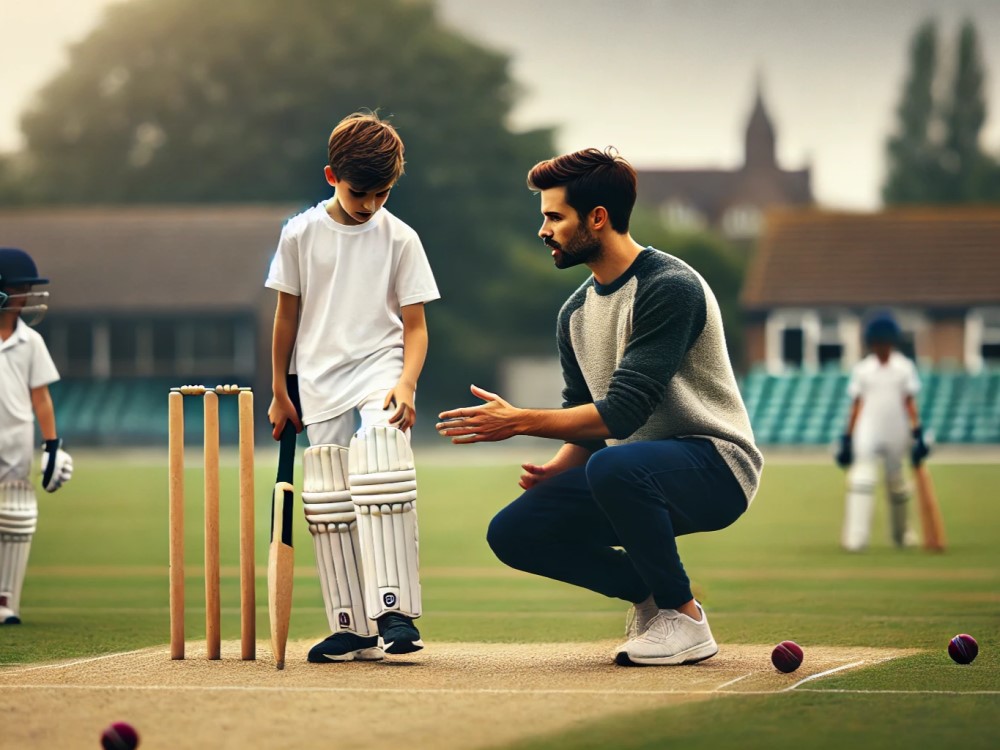
Cricket and Physical Fitness for Kids
Cricket and physical fitness for kids go hand in hand, offering a fun and engaging way for children to stay active and healthy. The benefits of playing cricket for children are numerous, providing them with not only physical exercise but also important life skills.
From building confidence and self-esteem through cricket to developing hand-eye coordination through cricket, the sport offers a holistic approach to children’s development.
One of the key aspects of cricket that makes it so beneficial for kids is its role as a team sport. Playing cricket helps children learn the value of teamwork and cooperation, which are essential skills both on and off the field. Additionally, the mental aspects of cricket for young players help in building resilience and strategic thinking.
Parents looking to get their kids involved in cricket will find a wealth of resources and opportunities. Cricket coaching techniques for kids are designed to be both fun and educational, ensuring that young players develop their skills in a supportive environment. Moreover, there are cricket games and activities for children that make learning the sport enjoyable and interactive.
Safety is also a critical consideration in youth sports, and cricket is no exception. Adhering to safety guidelines for kids playing cricket ensures that young athletes can enjoy the game while minimizing the risk of injury. Choosing the right cricket shoes and the right cricket bat size are important steps in preparing kids for safe and effective play.
For those interested in formal competition, there are numerous cricket tournaments and leagues for children that offer structured environments for skill development and friendly competition. Additionally, inclusive programs promote inclusivity and diversity in kids cricket, ensuring that the sport is accessible to all.
The journey of learning cricket can be greatly enhanced by involving parents. Parental involvement in kids cricket can motivate and support children, making the sport a family affair. Moreover, inspirational stories of young cricketers can serve as role models, showing kids what is possible with dedication and practice.
Cricket is an excellent way to promote physical fitness and personal development among children. Whether through structured coaching, fun activities, or competitive play, the sport provides a comprehensive approach to physical and mental well-being for young athletes.
Developing Strength and Endurance

Playing cricket is an excellent way for kids to build strength and endurance. The game involves a variety of physical activities that work different muscle groups, enhancing both muscular strength and cardiovascular endurance.
Batting requires upper body strength, particularly in the arms, shoulders, and chest. Kids develop these muscles by swinging the bat, which also improves their hand-eye coordination. Running between the wickets during batting sessions boosts cardiovascular fitness and leg strength. The quick sprints and agility needed to score runs enhance stamina and overall endurance.
Bowling is another activity that significantly contributes to strength building. Fast bowlers develop upper body strength through the repetitive action of delivering the ball at high speeds. Spin bowlers also benefit from increased flexibility and core strength. The dynamic movement involved in bowling, such as the run-up and follow-through, engages multiple muscle groups, enhancing overall body strength and endurance.
Fielding is an integral part of cricket that demands agility, speed, and quick reflexes. Kids improve their lower body strength by sprinting, diving, and jumping to catch or stop the ball. These activities also boost cardiovascular health, as fielders are constantly on the move, reacting to the ball’s direction. The diverse range of movements in fielding drills helps children develop a well-rounded fitness level, combining strength, speed, and agility.
Overall, the various aspects of playing cricket ensure that kids get a full-body workout, improving their strength, endurance, and overall physical fitness. Regular participation in cricket can lead to significant improvements in muscle tone, cardiovascular health, and general stamina, laying a strong foundation for a healthy and active lifestyle.
Enhancing Coordination and Balance
Cricket is a sport that requires excellent coordination and balance. These skills are crucial for performing well in the game and are beneficial for overall physical development in kids.
Hand-eye coordination is essential in cricket, especially when batting and fielding. When batting, kids need to time their swings accurately to hit the ball effectively. This skill develops through practice, as they learn to judge the speed, trajectory, and timing of the ball. Enhanced hand-eye coordination also translates to improved performance in other sports and daily activities.
Foot-eye coordination is another critical aspect, particularly for fielders and bowlers. Fielders must track the ball with their eyes while positioning their bodies to catch or stop it. Bowlers need to maintain proper foot placement and balance during their run-up and delivery. These actions help kids develop better foot-eye coordination, which is essential for various physical activities and sports.
Balance and stability are fundamental skills honed through playing cricket. Batsmen must maintain balance while swinging the bat and running between wickets. Bowlers need to balance their bodies during the delivery stride, ensuring they can bowl accurately and with power. Fielders often have to make quick, balanced movements to catch or throw the ball. These activities help kids develop strong core muscles and improve their overall balance and stability.
Reflexes and reaction time are also enhanced through cricket. The game demands quick responses to sudden changes, whether it’s a fast delivery, a sharp catch, or a sprint to stop a boundary. Kids learn to react swiftly and accurately, improving their reflexes and cognitive processing speed.
By participating in cricket, children can significantly enhance their coordination and balance. These skills are not only vital for excelling in sports but also contribute to better posture, reduced injury risk, and improved motor skills in everyday life. The development of coordination and balance through cricket ensures that kids grow up with a strong foundation for physical fitness and athleticism.
Improving Flexibility and Agility

Cricket is a dynamic sport that promotes flexibility and agility in kids. These attributes are essential for performing various cricketing actions and are beneficial for overall physical development.
Flexibility is crucial for executing different cricketing skills. Batsmen require flexibility in their wrists, shoulders, and torso to play a wide range of shots. Proper stretching and warm-up routines before practice sessions or matches help enhance flexibility, reducing the risk of injuries. Bowlers also benefit from improved flexibility, as it allows them to generate more power and accuracy in their deliveries. Stretching exercises that focus on the lower back, hips, and legs are particularly beneficial for bowlers.
Agility is another key component of cricket. Fielders need to be agile to cover ground quickly, change directions, and react to the ball’s movement. Agility drills, such as ladder exercises, cone drills, and shuttle runs, are commonly used in cricket training to enhance quickness and footwork. These drills help kids develop fast-twitch muscle fibers, improving their ability to accelerate, decelerate, and change direction efficiently.
Dynamic movements involved in cricket, such as diving catches, quick sprints, and sudden stops, contribute to overall agility. These movements require a combination of strength, coordination, and flexibility. By regularly practicing these actions, kids can enhance their agility, making them more effective on the field and in other physical activities.
Balance and body control are also improved through cricket. The sport demands a high level of proprioception, or body awareness, which helps players maintain control over their movements. Batsmen must balance their bodies while playing shots, and bowlers need to control their follow-through to avoid overstepping. Fielders often perform acrobatic moves to catch or stop the ball, requiring precise body control.
Through regular participation in cricket, kids can significantly improve their flexibility and agility. These attributes are not only important for cricket but also contribute to overall physical fitness and athleticism. Enhanced flexibility and agility help prevent injuries, improve performance in other sports, and promote a healthy, active lifestyle.
Promoting Cardiovascular Health
Cricket is an excellent way for kids to improve their cardiovascular health. The sport involves a variety of aerobic and anaerobic activities that enhance heart and lung function, leading to better overall fitness.
Aerobic activities in cricket, such as running between the wickets, fielding, and continuous movement on the field, provide a good cardiovascular workout. These activities increase the heart rate, improve circulation, and enhance the efficiency of the cardiovascular system. Regular participation in these aerobic exercises helps strengthen the heart muscle, reduces the risk of heart disease, and promotes overall cardiovascular health.
Anaerobic activities in cricket, such as sprinting to catch the ball, bowling fast deliveries, and playing powerful shots, also contribute to cardiovascular fitness. These high-intensity bursts of activity help improve anaerobic capacity, allowing the body to perform at high levels of exertion for short periods. This type of exercise enhances muscle strength and endurance, further contributing to overall fitness.
Endurance training is an integral part of cricket practice. Players often engage in running drills, interval training, and other endurance-building exercises to improve their stamina. These activities help kids build a strong cardiovascular foundation, enabling them to sustain prolonged physical activity without fatigue.
Healthy habits promoted through cricket, such as regular exercise and proper warm-up and cool-down routines, also contribute to cardiovascular health. Coaches and trainers emphasize the importance of maintaining a healthy lifestyle, including balanced nutrition and adequate hydration. These habits, when ingrained from a young age, can lead to lifelong benefits for cardiovascular health.
Mental well-being is another aspect of cardiovascular health that cricket can improve. Engaging in physical activity releases endorphins, which help reduce stress and anxiety. The social interaction and teamwork involved in cricket also contribute to positive mental health, fostering a sense of community and support.
By participating in cricket, kids can significantly improve their cardiovascular health. The combination of aerobic and anaerobic activities, along with the promotion of healthy habits, ensures that children develop a strong and efficient cardiovascular system. This foundation of cardiovascular fitness is crucial for overall health and well-being, reducing the risk of chronic diseases and promoting a healthy lifestyle.
Encouraging Healthy Lifestyle Choices

Cricket is more than just a sport; it encourages kids to adopt healthy lifestyle choices that benefit their overall well-being. The values and habits learned through playing cricket can have a lasting impact on children’s physical and mental health.
Regular physical activity is a cornerstone of a healthy lifestyle, and cricket provides an enjoyable way for kids to stay active. The sport’s engaging nature keeps children motivated to participate, ensuring they get regular exercise. Consistent physical activity helps maintain a healthy weight, reduces the risk of obesity, and promotes overall fitness.
Nutrition is another critical aspect of a healthy lifestyle that cricket emphasizes. Coaches and trainers often educate young players about the importance of a balanced diet to support their physical activity. Kids learn about the benefits of consuming a variety of foods, including fruits, vegetables, lean proteins, and whole grains. Proper nutrition provides the energy and nutrients needed for optimal performance and recovery, fostering healthy eating habits that can last a lifetime.
Hydration is essential for maintaining physical performance and overall health. Cricket players are taught the importance of staying hydrated, especially during practice sessions and matches. Drinking adequate water helps regulate body temperature, prevent dehydration, and support bodily functions. Developing good hydration habits through cricket can help kids understand the importance of drinking water regularly.
Sleep is another vital component of a healthy lifestyle. Physical activity, such as playing cricket, can improve sleep quality by promoting relaxation and reducing stress. Adequate sleep is essential for growth, development, and overall well-being. Coaches often emphasize the importance of getting enough rest to ensure optimal performance on the field.
Mental health and stress management are also promoted through cricket. The sport provides a positive outlet for kids to release stress and improve their mood. The camaraderie and teamwork involved in cricket create a supportive environment, fostering positive social interactions and reducing feelings of isolation. Engaging in physical activity and being part of a team can significantly enhance mental well-being, promoting a healthy and balanced lifestyle.
Discipline and time management are valuable skills learned through cricket. Regular practice sessions, matches, and training schedules teach kids the importance of discipline and commitment. Managing their time effectively to balance academics, cricket, and other activities helps children develop strong organizational skills.
By encouraging healthy lifestyle choices, cricket helps kids develop habits that benefit their overall well-being. The values and practices learned through playing cricket promote physical fitness, proper nutrition, hydration, sleep, mental health, and discipline, ensuring that children grow up with a strong foundation for a healthy and active life.
Building Social Skills and Teamwork
Cricket is a team sport that fosters the development of social skills and teamwork in kids. Playing cricket helps children learn to communicate effectively, collaborate with others, and build strong relationships, which are essential for their overall social development.
Communication skills are crucial in cricket, as players need to convey strategies, provide encouragement, and make quick decisions on the field. Whether it’s coordinating a run between wickets, setting fielding positions, or planning bowling tactics, effective communication is key. Kids learn to express themselves clearly and listen to others, enhancing their verbal and non-verbal communication skills.
Teamwork is at the heart of cricket. The sport requires players to work together towards a common goal, whether it’s scoring runs, taking wickets, or fielding effectively. Through cricket, kids learn the importance of cooperation, mutual support, and trust. They understand that success in the game depends on the collective efforts of the team, rather than individual performances.
Leadership skills are also developed through cricket. Kids have opportunities to take on leadership roles, such as team captain or vice-captain, where they learn to motivate and guide their teammates. These roles teach responsibility, decision-making, and the ability to inspire others. Even without formal leadership positions, players often lead by example, demonstrating positive behaviors and attitudes that others can follow.
Conflict resolution is another important skill learned through cricket. As with any team sport, disagreements and conflicts can arise. Cricket teaches kids how to handle these situations constructively, finding solutions that benefit the team. They learn to negotiate, compromise, and maintain a positive atmosphere, which are valuable skills for life beyond the cricket field.
Respect and sportsmanship are integral values in cricket. Players are taught to respect their opponents, teammates, coaches, and officials. This includes accepting umpires’ decisions gracefully, congratulating opponents on their successes, and playing the game fairly. These values promote a positive and inclusive environment, where everyone feels valued and respected.
Building friendships is a natural outcome of playing cricket. The shared experiences, challenges, and triumphs on the field create strong bonds among teammates. Kids develop friendships that extend beyond the game, providing a supportive social network. These relationships contribute to a sense of belonging and community, which is important for emotional well-being.
Empathy and understanding are also fostered through cricket. By working closely with teammates from diverse backgrounds, kids learn to appreciate different perspectives and experiences. This helps them develop empathy, understanding, and acceptance of others, promoting a more inclusive and harmonious social environment.
By building social skills and teamwork, cricket helps kids develop important interpersonal skills that are essential for their overall growth and development. These skills not only enhance their performance in the sport but also prepare them for successful interactions in various aspects of life.
Fostering Discipline and Focus

Cricket is a sport that requires a high level of discipline and focus, both on and off the field. By participating in cricket, kids learn to develop these important attributes, which are beneficial for their overall personal and academic growth.
Discipline is a key component of cricket training. Regular practice sessions, drills, and fitness routines require kids to be committed and consistent in their efforts. They learn to follow a structured training schedule, adhere to rules and guidelines, and strive for continuous improvement. This discipline translates to other areas of life, such as academics and personal responsibilities, helping kids develop a strong work ethic.
Focus and concentration are essential for success in cricket. Whether it’s a batsman facing a fast bowler, a bowler delivering a precise line and length, or a fielder anticipating a catch, the game demands intense concentration. Kids learn to block out distractions and maintain their focus on the task at hand. This ability to concentrate deeply enhances their performance in cricket and improves their attention span in academic and other activities.
Goal setting and achievement are integral parts of cricket. Coaches often set specific goals for players, such as improving batting averages, increasing bowling speed, or enhancing fielding accuracy. Kids learn to set personal goals, work towards them, and measure their progress. Achieving these goals provides a sense of accomplishment and motivates them to strive for higher targets. This practice of goal setting and achievement is a valuable skill that benefits kids in all aspects of life.
Time management is another important skill developed through cricket. Balancing practice sessions, matches, schoolwork, and other activities requires effective time management. Kids learn to prioritize tasks, plan their schedules, and allocate time efficiently. This helps them become more organized and manage their time effectively, reducing stress and enhancing productivity.
Resilience and perseverance are fostered through cricket. The sport involves challenges, setbacks, and failures, such as getting out early, missing a catch, or losing a match. Kids learn to handle these disappointments with resilience, understanding that setbacks are part of the learning process. They develop perseverance by continuously working to improve their skills and performance, even in the face of difficulties. This resilience and perseverance are crucial for personal growth and success in various endeavors.
Self-discipline is also emphasized in cricket. Players need to maintain physical fitness, follow nutritional guidelines, and get adequate rest to perform at their best. Self-discipline helps kids make healthy choices, avoid harmful behaviors, and stay focused on their goals. It also teaches them the importance of self-control and responsibility, contributing to their overall character development.
By fostering discipline and focus, cricket helps kids develop essential life skills that enhance their personal and academic growth. These attributes contribute to their success in the sport and prepare them for future challenges and opportunities.
The Transformative Benefits of Cricket for Kids: Beyond Physical Fitness

Cricket is more than just a sport for kids; it is a comprehensive activity that promotes physical fitness, social skills, discipline, and a healthy lifestyle. From building strength and endurance to enhancing coordination and balance, cricket offers numerous benefits that contribute to overall physical development. Engaging in cricket helps children develop vital motor skills and maintain a healthy level of physical activity, which is essential for their growth and well-being.
Beyond the physical advantages, cricket encourages healthy lifestyle choices by instilling the importance of regular exercise and balanced nutrition. Participation in sports like cricket can help children understand the value of maintaining a healthy body and mind, fostering habits that can last a lifetime. These healthy practices can contribute significantly to their long-term well-being, reducing the risk of lifestyle-related diseases.
Cricket also plays a crucial role in fostering social skills and teamwork. The nature of the sport requires players to work closely with their teammates, communicate effectively, and strategize together to achieve common goals. This collaborative aspect of cricket helps children develop essential social skills, such as cooperation, leadership, and empathy. These skills are invaluable, both on and off the field, aiding in their interactions with peers and adults.
Discipline and focus are other critical attributes that cricket helps cultivate in young players. The sport requires consistent practice, adherence to rules, and a high level of concentration, which teaches children the importance of discipline and hard work. These lessons in discipline can translate into better academic performance and a more structured approach to their daily activities.
By participating in cricket, children gain valuable skills and attributes that benefit their personal growth, academic success, and overall well-being. The lessons learned through cricket extend beyond the field, preparing kids for a healthy, active, and successful life. Encouraging children to play cricket not only helps them stay fit and active but also instills important values and skills that will serve them well throughout their lives.
Cricket is a multifaceted sport that offers significant benefits for children’s physical, social, and emotional development. It promotes a healthy lifestyle, fosters essential social skills, and instills discipline and focus. By supporting children in playing cricket, we help them build a foundation for a well-rounded, successful, and healthy future. The impact of cricket on a child’s life is profound, providing them with the tools they need to thrive both on and off the field.





